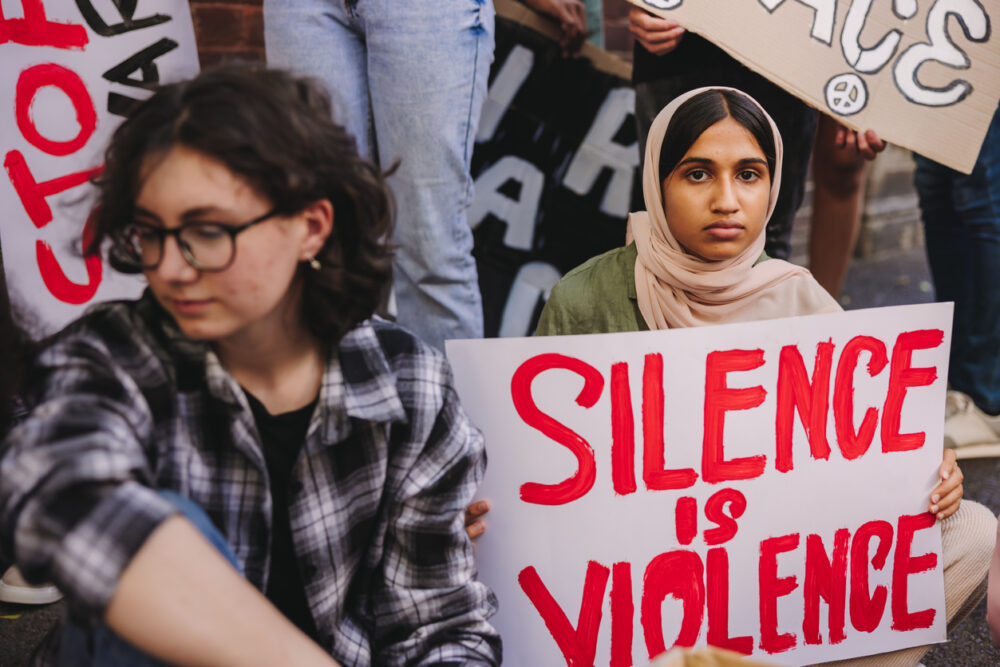Freedom is slipping away while you wait—here’s how to grab it back.

It’s easy to feel like the world’s spinning out of control—and harder still to believe you can do anything about it. You read the headlines, scroll past the chaos, and wonder when things started feeling so upside down. Authoritarianism doesn’t show up wearing jackboots and waving flags anymore. It creeps in with censorship masked as safety, division disguised as patriotism, and rights chipped away so slowly you barely notice. And while the loudest voices often get the most airtime, silence is its own kind of fuel.
You don’t have to be a politician, an activist, or even someone who likes confrontation to stand up. You just need to decide you’ve had enough. The truth is, waiting for someone else to make it better only gives those in power more time to tighten their grip. Change starts with you, in ways that are simpler—and more powerful—than you might think.
1. Speak up even when your voice shakes.

It’s tempting to keep your mouth shut, especially when everyone around you seems to agree with something that feels wrong in your gut. You don’t want to start an argument, lose friends, or risk your job. But silence gives oppression space to grow. Speaking up doesn’t always mean shouting into a megaphone or starting debates on social media.
It might just mean asking questions that make people think or calmly pointing out when something seems unfair. Your voice matters, even if it feels small. The more often you speak out, the easier it gets. Says Thomas Henricks Ph.D. in an article for Psychology Today, authoritarianism relies on fear and compliance, not critical thinking or courageous conversations. When you challenge dangerous ideas—especially in everyday conversations—you break the illusion that everyone agrees.
That ripple can reach further than you realize. Courage is contagious. When others see you standing up, they may find the strength to do the same. One brave voice can shift an entire room. It might feel uncomfortable at first, but discomfort is a small price to pay for preserving freedom. History has always favored the ones who dared to speak.
2. Refuse to normalize cruelty and injustice.

It’s shocking how quickly people adapt to what once seemed unthinkable. Little by little, society lowers the bar. What used to spark outrage suddenly becomes “just the way things are.” That’s how cruelty gains traction—through repetition and silence, reports Robin Douglass et al., in research published by Sage Journals. You don’t have to accept it, though. When someone says something dehumanizing or laughs off suffering, call it what it is. You don’t need to scream or shame; just speak with clarity and conviction. Say, “That’s not okay.” Say it with your tone, your words, and even your silence if needed. Look away when others cheer cruelty. Step back from those who celebrate control.
The more we excuse the inexcusable, the more we invite it in. Refusing to normalize it is an act of rebellion. It keeps your own moral compass intact and reminds others they’re not crazy for feeling outraged. In a world numbed by repetition, decency becomes a radical stance. Your refusal to shrug off injustice could be the signal someone else needs to stop pretending it’s fine. Normal doesn’t always mean right—don’t let yourself forget that.
3. Question the narrative, even if it sounds patriotic.

Just because something is wrapped in a flag doesn’t make it right. Authoritarian systems often hijack national pride to push harmful agendas. You hear phrases like “for the good of the country” or “real patriots support this,” and suddenly it feels risky to question what’s happening. But blind allegiance isn’t patriotism—it’s control, note Steven Levitsky and Lucan A. Way writing for ForeignAffairs.com. Real love for your country means wanting it to live up to its ideals, not turning a blind eye to its flaws. It’s okay to ask, “Who benefits from this?” or “What’s the bigger picture here?” Critical thinking isn’t disloyal—it’s essential. When you ask the hard questions, you disrupt the script that power wants everyone to follow without hesitation. It doesn’t make you un-American. It makes you aware.
Loyalty to truth is more valuable than loyalty to slogans. You owe it to yourself—and to your community—to keep your mind open and alert. Pride should never come at the expense of justice. A healthy democracy thrives when people question authority, not when they blindly follow it. Real change begins with curiosity, not compliance.
4. Stop sharing content that spreads fear and division.

Fear is one of the oldest tools in the authoritarian playbook. When people are scared, they’re easier to manipulate—and even easier to turn against each other. Social media is flooded with headlines designed to provoke outrage and panic, and it’s tempting to share them without digging deeper. But every repost, retweet, or reaction contributes to the noise, even if your intention was harmless. Before hitting share, ask yourself who benefits from the fear and chaos. Is the information true, or just emotionally charged clickbait? Take a breath, do a quick fact check, and consider whether it brings clarity or confusion.
You don’t have to become the internet’s watchdog, but you do have a responsibility to protect your own mind and others’ from misinformation. Refusing to feed the frenzy is a quiet kind of resistance. It’s how you protect community trust and collective sanity. Even better, share content that brings insight, encourages empathy, or inspires action. Be the calm voice in the storm instead of another spark in the fire. Your digital footprint leaves a real-world impact—make it count.
5. Support local journalism and independent media.

When power goes unchecked, the truth is usually the first casualty. Authoritarian regimes thrive when the press is weak, silenced, or under control. That’s why local journalism matters more than ever—it brings accountability to your own backyard. These small but mighty outlets often expose corruption, highlight community voices, and share stories that national media overlook. But many are barely hanging on due to lack of funding or public support. Subscribing, donating, or even just reading their work helps keep their lights on and their reporting alive. Independent media, especially those not backed by big corporations, often ask the questions others won’t. They take risks, dig deeper, and challenge the dominant narrative.
When you support these truth-tellers, you create demand for transparency and integrity. You also send a clear message: the truth still matters. It’s easy to feel powerless watching the news, but this is something tangible you can do. Your support is more than a transaction—it’s a vote for a free and informed society. Don’t underestimate the power of your attention. Where you focus it shapes what survives.
6. Stop waiting for politicians to save the day.

It’s easy to put all your hope—and frustration—into whoever holds office. But no politician, no matter how charismatic or well-meaning, can singlehandedly protect democracy. Waiting for someone at the top to fix things keeps you passive and disempowered. Change doesn’t trickle down from speeches and promises; it rises up from communities that stay engaged and informed. The people closest to the problem are often the ones with the best solutions, and that includes you. You don’t have to run for office to make a difference. You can show up to town halls, volunteer for causes that matter, or organize around local issues. These small actions add up and ripple outward.
Politicians often respond to pressure, not principle—so be the pressure. Stop hoping they’ll grow a conscience and start giving them a reason to listen. You’ve got more power than you think. The moment you realize it, you stop waiting and start moving. That’s when real momentum begins.
7. Make civic involvement a regular habit, not a once-a-year event.

Voting is important, but it’s just the beginning. If the only time you engage with democracy is during elections, you’re missing most of the action. Authoritarianism doesn’t usually arrive all at once—it sneaks in while people are too distracted or disengaged to notice. Show up to school board meetings, pay attention to city council decisions, and know who’s making choices in your name. These local events are where policies take root before they grow into national headlines. When you make civic participation a habit, you’re building a muscle that keeps democracy resilient.
It doesn’t have to take over your life—just 30 minutes here or there can make a huge difference. Ask questions. Hold people accountable. Celebrate the wins and call out the red flags. When people in power know you’re watching, they’re more likely to act with integrity. The more involved you are, the harder it becomes for authoritarianism to thrive unnoticed. Democracy isn’t something you visit occasionally—it’s something you live.
8. Don’t fall for the “us versus them” trap.

Dividing people is one of the easiest ways to gain control. When you’re busy hating your neighbor, you’re not watching what power is doing behind closed doors. Authoritarian systems love to stir up fear, pit groups against each other, and paint the world in black and white. It makes people easier to manipulate—and much less likely to unite. But life is messy, and people are complex. The more you buy into “us versus them,” the more you shrink your ability to think critically and connect compassionately. Resist the urge to write someone off based on one belief or label.
Try to understand where others are coming from, even if you disagree. Building bridges doesn’t mean you compromise your values—it means you protect your humanity. The more divided we are, the easier it is for authoritarianism to gain ground. Community isn’t just a feel-good word—it’s your strongest defense. When people unite across lines, oppressive systems start to wobble. Refuse to be a pawn in someone else’s power game.
9. Teach your kids to question authority—not fear it.

Raising kids who follow rules blindly is not a victory. It’s an invitation for future abuse of power. Teach them to respect others, sure—but also to think for themselves and speak up when something feels off. Encourage curiosity, not conformity. Help them understand that rules should make life safer and fairer—not just easier for people in charge. When they see unfairness, teach them to name it. Show them how to challenge ideas without being disrespectful. Kids who grow up asking questions are far more likely to become adults who defend freedom.
That kind of confidence starts at home. You don’t need to have all the answers—just create a space where it’s safe to wonder out loud. Authoritarianism hates critical thinkers. So raise them. Guide them. Let them know that even as kids, their voices matter. The future depends on whether the next generation is taught to obey or to question. Choose the path that keeps freedom alive.
10. Call out manipulation—even when it comes from “your side.”

It’s uncomfortable to admit when someone you like, trust, or agree with crosses a line. But loyalty shouldn’t blind you to manipulation. Just because it’s coming from your side doesn’t make it any less dangerous. Authoritarianism often hides behind good intentions and charismatic figures.
It whispers, “We have to do this to protect our values,” even as it erodes the very freedoms it claims to defend. Staying silent just because you agree with the larger message creates space for abuse to grow unchecked. Call it out. Be consistent.
The truth doesn’t change depending on who’s saying it. Integrity means holding everyone to the same standards, not turning a blind eye when it’s convenient. People respect honesty—even when it stings. Speaking up within your own circles is more powerful than shouting at strangers. You keep the movement honest. You protect its soul. Blind loyalty is the gateway drug to authoritarianism. Clear-eyed accountability is the antidote.
11. Build real-world connections, not just online outrage.

Ranting on social media might feel cathartic, but it rarely leads to meaningful change. Authoritarian systems thrive when people are isolated, distracted, and convinced they’re alone. Real connection is a form of resistance. When you gather in person, look someone in the eye, and talk about what matters, you create trust and momentum. Community isn’t just emotional support—it’s how strategies form and actions happen. Volunteer for something that aligns with your values. Join a local group. Host conversations.
Do something that exists outside the scroll and click. The internet is loud, but it’s not always deep. In-person bonds are harder to manipulate and easier to grow into something powerful. People need to feel seen and heard, not just liked and retweeted. Organizing face-to-face gives people courage and clarity. It reminds everyone that they’re not alone in wanting better. You don’t need a massive platform—you just need people willing to stand beside you.
12. Use your money as a tool for resistance.

Every dollar you spend sends a message, whether you realize it or not. Authoritarianism is often propped up by powerful corporations that profit from silence, division, or control. Choosing where your money goes isn’t just economic—it’s political. Support businesses that align with your values. Invest in companies that treat workers fairly, protect the planet, and take a stand for human rights. Divest from those that exploit, deceive, or enable authoritarian behaviors. Your purchases, your investments, even your bank—these choices matter.
You don’t have to be wealthy to make an impact. Shifting a little here, withholding support there—it all adds up. If enough people change their spending habits, the system takes notice. Money talks in ways protests can’t always reach. Being a conscious consumer is a quiet but potent form of resistance. You’re already spending—now spend with intention. Don’t just buy things. Buy power back.
13. Stay hopeful even when it feels pointless.

Hope might seem naive in the face of corruption, lies, and rising fear—but it’s actually one of the most rebellious things you can hold on to. Authoritarianism thrives on despair. It wants you to believe nothing you do matters, that it’s all too broken to fix. That kind of thinking is paralyzing, and it’s exactly what keeps people from taking action. Hope isn’t about ignoring reality. It’s about believing in your own power to shape it. Even when things are bleak, you can choose to fight for what’s right. You can believe that truth still matters, that kindness can win, that community can hold.
That kind of belief gives you stamina. It fuels movements, sustains momentum, and sparks change in places you never expected. When you stay hopeful, you keep your light on—and that light can guide others. You don’t have to be blindly optimistic. Just refuse to give up. Hope is strength. Keep it alive, and you become ungovernable in the best way.
